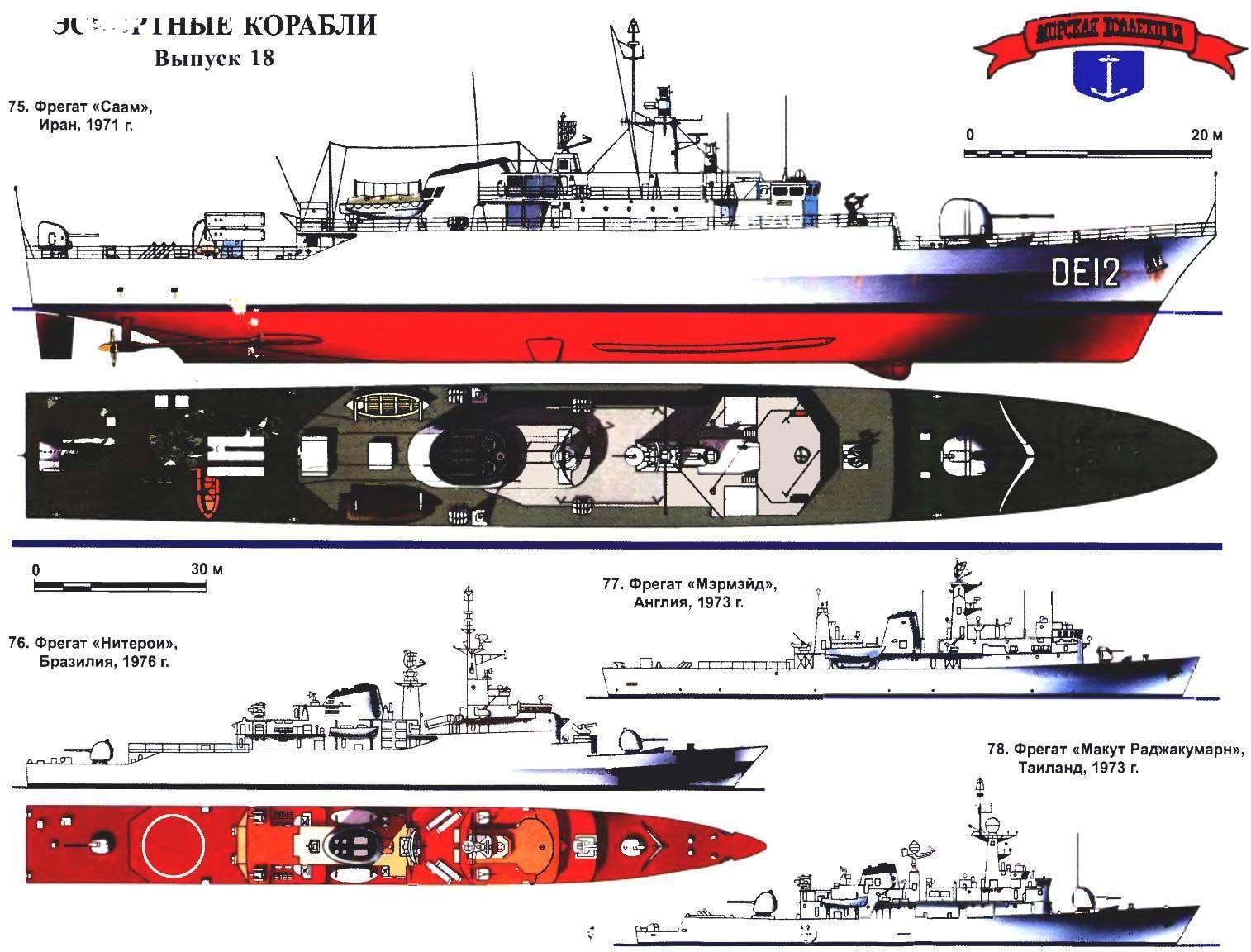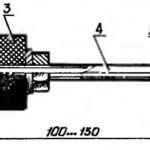 The collapse of the colonial system after world war II and the emergence on the map of many independent States initially did not affect the balance of power in the oceans. “Microscopic” fleets of new countries of Asia and Africa were equipped with mostly antiquated vessel, shipped from the US, Britain and Soviet Union under military assistance programmes. No need to develop special export projects warships during the first two postwar decades was not felt.
The collapse of the colonial system after world war II and the emergence on the map of many independent States initially did not affect the balance of power in the oceans. “Microscopic” fleets of new countries of Asia and Africa were equipped with mostly antiquated vessel, shipped from the US, Britain and Soviet Union under military assistance programmes. No need to develop special export projects warships during the first two postwar decades was not felt.
But in the 1960-ies the situation has changed. The number of so-called “developing” countries had more free money – generally, it was oil money, the flow of which is due to the increasing demand for “black gold” grew from year to year. Accordingly, grew, and ambitions of the governors of oil-producing States. Well, since the Navy has always been a favorite toy for dictators and monarchs, it’s no wonder that soon the Navy of the third world countries began to be equipped quite modern warships. And so, they would envy and most powerful sea power…
Indeed, it is ironic, but the world’s first frigate, equipped with attack missile weapons, appeared as part of the Navy of Iran. Shah Mohammed Reza Pahlavi, claimed the dominant role of his country in the middle East, and radical strengthening of the Iranian Navy was an integral part of the military-political expansion of Tehran. In August 1966, London hosted the signing of a contract for the construction of four frigates of the “Saam”, which became the first universal ships of the new generation and influenced the development of the class of frigates worldwide.
In fact, the development of the project of the frigate, which had the marking “vosper’s MK-5”, was conducted by the English firm “vosper’s-thornycroft” even before signing the contract with Iran. At the time of the British private companies (and to them belonged the “vosper’s-thornycroft”) has not been spoiled by orders from the Admiralty, and supply of products for export gave almost the only chance to survive. Of course, if to emerge victorious in a tough competition on the foreign market of armaments.
It should be recognized that the designers “vosper’s-Thornycroft” well coped with the task, they were among the first to understand the global trend to a steady growth in the size and cost of specialized warships — will inevitably lead to a dead end. Alternatively, they proposed a very compact but powerful weapons and truly versatile frigate. To achieve this they managed thanks to a wide introduction of technical and technological innovations. First, in the combination diesel-gas turbine plant includes the newly created turbine “Olympus” production company, “rolls-Royce”, according to the specific power greatly surpassing its predecessors. Second, almost all the weapons belonged to the newest, sometimes even experimental models, lighter and more compact than previously used. And, thirdly, a high level of automation determined the reduction in crew size (twice – up to 125 people) and consequently a reduction in the area of the premises. In addition, the project laid the ability to aggregate method of repair – along with a small crew this significantly reduced the operating costs of the ship.
About the arming of the frigate “Saam” you should tell apart. The first ship of its class equipped with guided anti-ship missiles (ASM). As in England, such weaponry was not yet in sight, the designers have opted for a complex “sea Killer” (“Sea killer”) in Italy. Interestingly, patientline rotary launcher complex on the ships assembled in Naples, the path of frigates to the place of their service. Barely testing of these RCC ended as “Saam” with their sisterships have become the first carriers.
The highest praise he deserved and artillery. Latest 114-mm automatic installation of the MK-8 had a reaction time (the time to prepare for the open fire) and 15 rate of fire 20 rounds per minute. However, these cannons were only two of the last ship of a series “Rostam” and “Farmers”. The first two, “Saam” and “Zaal”, first had to equip old gun mount MK-5, but in the course of modernization it also replaced the MC-8.
Aft, near the transom, has posted another new stable paired 35-mm anti-aircraft guns “Oerlikon”. It was fully automated and theoretically had a rate of fire of 550 rounds per minute. It is worth mentioning that artillery weapons were built at the same time frigates of the “Linder” in comparison with “Lapp” seemed a complete anachronism.
Air defenses of Iran’s frigates supplemented anti-aircraft missile complex “sea cat”, and the fight against submarines was assigned to triple a 305-mm mortars “limbo”. Of course, “sea cat” it’s hard to call it efficient weapons, but the mere presence on the ship of small displacement two types of missiles for 1960-ies was a kind of sensation. Well, if it said to add on state of the art electronics and a very reasonable price of 6.5 million lb. article for the ship (about a third less than their counterparts of the same displacement), it becomes clear why the Iranian frigates caused a great resonance in the market of naval weapons. Clear and bewilderment of the British admirals — because in their country for third world countries built ships more modern than the “mistress of the seas”!
Incidentally, the frigates of the “Saam” the history of the service was no less interesting than the story of their creation. Unlike most of their peers, they had seriously to war. They were widely used during the Iran-Iraq war; according to unconfirmed reports, one of the frigates in November 1980, sunk by a missile “si Killer” Iraqi landing craft. After beginning the “tanker war” in the Persian Gulf in the course of the fighting openly intervened with the U.S. Navy. For Iran this had tragic consequences. On 18 April 1988, shortly after the mine explosion the American frigate “Samuel B. Roberts”, the frigate “Sahand” (formerly “Farmers”) was attacked by anti-ship missiles “Harpoon” and attack the “Intruder” with the nuclear aircraft carrier “enterprise”. After receiving several hits by bombs and three missiles, in flames, the ship went to the bottom. Near sister-ship “Sabalan” (formerly “Rostam”) received a serious injury (he was struck by RCC “Harpoon”), but he was able to get to the base. His repair lasted more than a year.

75. The frigate “Saam”, Iran, 1971
Built in England in the shipyard of “vosper’s-thornycroft”. Displacement standard, t 1110, 1290 full t maximum Length of 94.4 m, width 10.4 m, draught 3,4 m. Capacity twin-shaft diesel-gas turbine plants 49 800 HP, speed 40 knots. Armament: 1×5 PU ASM “si Killer”, 1×3 PU SAM “sea cat”, 114-mm automatic cannon, and twin 35-mm gun, mortar “limbo”. Only in 1971 and 1972, he built four units: “Saam”, “Zaal”, “Rostam” and “Farmers”.
76. The frigate “Niteroi”, Brazil, 1976.
Built in England in the shipyard of “vosper’s-thornycroft”. The standard displacement of 3200 tons, full 3800 T. maximum Length 129,2 m, width 13,5 m, draught 5.5 m. Capacity twin-shaft diesel-gas turbine 74 000 HP, speed 30 knots. Armament: 4 PU ASM “Exocet”, 2×3 PU SAM “sea cat”, 1×1 PU plourac’h “Icarus”, 114-mm automatic gun, two 40-mm machine gun, rocket-propelled mortars “Bofors”, 2×3 324-mm TA PLO, helicopter Linc. Only in 1976 — 1978 built four units in England and two in Brazil (the latter is plourac’h “Icarus” was carrying the second 114-mm gun).
77. The frigate “Mermaid”, England, 1973
Built in England in the shipyard of “yarrow” for Ghana. The standard displacement of 2,300 t, the full 2520 T. maximum Length 103,4 m width 12.2 m, draft of 3.7 m. Capacity twin-shaft diesel installation 14 400 HP, speed 24 knots. Armament: 114-mm automatic gun, four 40-mm machine gun, mortar “limbo”. Actually built in 1968 and laid up. In 1977 sold to Malaysia.
78. The frigate “Makut Rajakumar”, Thailand, 1973
Built in England in the shipyard of “yarrow”. The standard displacement of 1650 tons, full 1900 t maximum Length of 97.6 m, beam 11 m, draught 5.5 m. Capacity twin-shaft diesel-gas turbine installation 29 125 HP, speed 26 knots. Armament: 1×3 PU SAM “sea cat”, two 114-mm automatic guns, two 40-mm machine gun, mortar “limbo”.
Three survivors of the war of the Iranian frigate in 1996 — 1998 modernized, with the result that the armament became more “international” than before. Instead of the RCC “si Killer” installed four container of powerful Chinese anti-ship C-802 missiles “Inci-2” (in Iran has received the designation “Tondar”), and SAM “sea cat” was replaced by twin 23-mm gun mount EC-23-2 Soviet model, but also in China. Mortars “limbo” was removed; it was replaced by two three-pipe anti-submarine torpedo tubes. Changes to the electronic and navigational AIDS. Renewed Iranian ships, in spite of his more than 30 years of age, are today.
In February 1968, when the second pair of frigates for Iran has not even been laid firm “vosper’s-thornycroft” has received a new order, this time from Libya. The project of the frigate “Date Asavari” had branded marking “vosper’s MK-7” and was a increase of “Saam” with a slightly different armament. Standard displacement increased to 1325 tons, maximum length — to 100.6 m. the RCC Is “si Killer” first set the second set is “sea cat”, which the Libyan frigate against their Iranian counterparts looked more pale. Only after a thorough modernization carried out in 1980 and 1983 in Italy, “Date Asavari” received powerful missiles — SAM “Albatros” and four container launchers ASM “Otomat” and two three-pipe apparatus for anti-submarine torpedoes. Currently, the frigate decommissioned fleet, but continues to be used as a stationary training ship.
The success of the company “vosper’s-thornycroft” in the field of export supplies of steel one of the reasons that she got and the “state order” to create a frigate for the Roy Yal Neyvi Amazon superficially reminiscent of the “Iranians” and “Libyan”, but was much larger and was equipped with a helicopter. However, the Royal fleet left this ship not very happy (see “modelist-Konstruktor” No. 9 for 2004).
But based on Amazon born a new and highly successful export project, “vosper’s MK-10”, which immediately found a customer — Brazil. By further increasing the displacement on the Brazilian frigate, named “No-Terai”, has placed the entire range of weapons, including the French RCC “Exocet” and the Australian anti-submarine recettore “Icarus”. Due to the broad automation (traditional trump card “vosper’s-Thornycroft”) crew size was only 200 people — and a half times less than similar sized destroyer “Sheffield”. Just ordered six ships of the type “Niteroi”, and two of them were built under license at shipyard in Rio de Janeiro.
Eternal rival “vosper’s-Thornicroft” the firm “yarrow”, also took a course on the development of export projects in the 1960-ies. The first contract for the construction of the frigate was signed with the government of Ghana. However, a pretty impressive size ship their capabilities, looked modestly. Which is not surprising: he had the role of the staff of the ship and presidential yacht. Therefore, the decoration of the interior was given more attention than the weapons, which was mainly represented by the samples during the Second world war.
But here’s the thing: the frigate was almost ready when, in 1968, in Ghana, a military coup, and replaced the overthrown President Nkrumah rulers priorities were different… the Ship had to put into storage. After long negotiations he is in 1973 and finally became part of the British Navy under the name “Mermaid”, but was only used for training voyages with cadets of the naval school. Four years later, the junk frigate succeeded (fortunately for the British!) rafting Malaysia, where it was named “hang tuah”. He was in combat service until 1991, but then was finally “demoted” to a training ship.
At the time of purchase unhappy “Mermaid” (so translated the word “Mermaid”) as part of the Navy of Malaysia was already another frigate, also built by the firm “yarrow”. “Hang Jebat” was designed as a direct competitor to the Iranian “Saam”. He was somewhat larger than its “voprosah” brother, also had disengenuously power, is quite of modern electronics, and relatively small (140 people) crew. However, armed with the “hang Jebat” markedly inferior “Saam”: his missile weapons were limited to one SAM “sea cat”, and the main artillery calibre was presented the old 114-mm gun with manual loading… Lost he speed, developing only 26 knots on gas turbines and 16 — on diesels.
Very close in type frigate, but slightly larger in 1973 became part of the fleet with Malaysia neighbouring country, Thailand. “The macoutes Rajakumari” was also built in England in the shipyard of “yarrow”. His weaponry included anti-aircraft missiles-tion complex “sea cat”, automatic two 114-mm artillery systems MK-8 and two standard 40-mm “Bofors”. Thanks to the Executive mind and the Admiral’s spacious rooms this ship for a quarter of a century, served as the flagship of the Thai Navy until the appearance of the composition of carrier “Chakri Naruebet”.
In conclusion, we should recognize the not so obvious fact: at the turn of the 60-ies and 70-ies of XX century the most advanced projects of the British frigates were created by private firms for export. The export ships of this class were first truly multi-purpose. And leading Maritime powers soon had, paradoxically, to learn from the experience of third world countries.
S. BALAKIN



